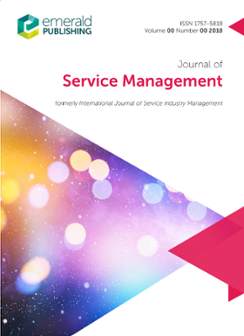Frontline employee expectations on working with physical robots in retailing
IF 7.9
2区 管理学
Q1 MANAGEMENT
引用次数: 5
Abstract
PurposeService robots have increasingly been utilized in retail settings, yet empirical research on how frontline employees (FLEs) might deal with this new reality remains scarce. This mixed-methods study aims to examine how FLEs expect physical service robots to impact job characteristics and affect their job engagement and well-being.Design/methodology/approachFirst, explorative interviews (Study 1; N = 32) were conducted to investigate how FLEs currently experience job characteristics and how they believe robots might impact these job characteristics and job outcomes. Next, a survey (Study 2; N = 165) examined the relationship between job characteristics that retail FLEs expect to be impacted by robots and their own well-being and job engagement.FindingsWhile the overall expectations for working with robots are mixed, retail FLEs expect that working with robots can alleviate certain job demands, but robots cannot help to replenish their job resources. On the contrary, most retail FLEs expect the pains and gains associated with robots in the workspace to cancel each other out, leaving their job engagement and well-being unaffected. However, of the FLEs that do anticipate that robots might have some impact on their well-being and job engagement, the majority expect negative effects.Originality/valueThis study is unique in addressing the trade-off between expected benefits and costs inherent to job demands-resources (JD-R) theory while incorporating a transformative service research (TSR) lens. By integrating different streams of research to study retail FLEs' expectations about working with robots and focusing on robots' impact on job engagement and well-being, this study offers new insights for theory and practice.一线员工对零售业中使用实体机器人的期望
服务机器人越来越多地应用于零售环境,但关于一线员工如何应对这一新现实的实证研究仍然很少。这项混合方法的研究旨在研究员工期望物理服务机器人如何影响工作特征,并影响他们的工作投入和幸福感。设计/方法/方法首先,探索性访谈(研究1;N = 32),以调查员工目前如何体验工作特征,以及他们如何认为机器人可能会影响这些工作特征和工作结果。接下来是一项调查(研究2;N = 165)研究了零售业员工期望受到机器人影响的工作特征与他们自己的幸福感和工作投入之间的关系。尽管对与机器人一起工作的总体期望参差不齐,但零售企业认为,与机器人一起工作可以减轻某些工作需求,但机器人不能帮助补充他们的工作资源。相反,大多数零售业员工认为,与工作空间中的机器人相关的痛苦和收益会相互抵消,而他们的工作投入和幸福感不会受到影响。然而,在预计机器人可能会对他们的幸福感和工作投入产生影响的员工中,大多数人预计会产生负面影响。原创性/价值本研究在结合变革服务研究(TSR)视角的同时,解决了工作需求-资源(JD-R)理论固有的预期收益和成本之间的权衡,这是独一无二的。通过整合不同的研究流来研究零售业员工对与机器人合作的期望,并关注机器人对工作投入和幸福感的影响,本研究为理论和实践提供了新的见解。
本文章由计算机程序翻译,如有差异,请以英文原文为准。
求助全文
约1分钟内获得全文
求助全文
来源期刊

Journal of Service Management
MANAGEMENT-
CiteScore
19.20
自引率
9.40%
发文量
55
期刊介绍:
The Journal of Service Management (JOSM) centers its scope on research in service management. It disseminates papers showcasing distinctive and noteworthy contributions to service literature, serving as a communication platform for individuals in the service management field, transcending disciplines, functional areas, sectors, and nationalities. The journal publishes double-blind reviewed papers emphasizing service literature/theory and its practical applications.
 求助内容:
求助内容: 应助结果提醒方式:
应助结果提醒方式:


